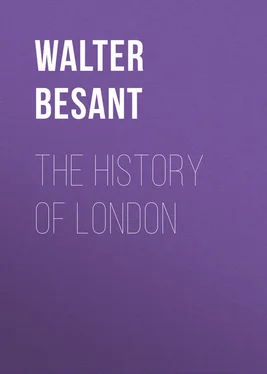Walter Besant - The History of London
Здесь есть возможность читать онлайн «Walter Besant - The History of London» — ознакомительный отрывок электронной книги совершенно бесплатно, а после прочтения отрывка купить полную версию. В некоторых случаях можно слушать аудио, скачать через торрент в формате fb2 и присутствует краткое содержание. Жанр: foreign_antique, foreign_prose, Историческая проза, на английском языке. Описание произведения, (предисловие) а так же отзывы посетителей доступны на портале библиотеки ЛибКат.
- Название:The History of London
- Автор:
- Жанр:
- Год:неизвестен
- ISBN:нет данных
- Рейтинг книги:5 / 5. Голосов: 1
-
Избранное:Добавить в избранное
- Отзывы:
-
Ваша оценка:
- 100
- 1
- 2
- 3
- 4
- 5
The History of London: краткое содержание, описание и аннотация
Предлагаем к чтению аннотацию, описание, краткое содержание или предисловие (зависит от того, что написал сам автор книги «The History of London»). Если вы не нашли необходимую информацию о книге — напишите в комментариях, мы постараемся отыскать её.
The History of London — читать онлайн ознакомительный отрывок
Ниже представлен текст книги, разбитый по страницам. Система сохранения места последней прочитанной страницы, позволяет с удобством читать онлайн бесплатно книгу «The History of London», без необходимости каждый раз заново искать на чём Вы остановились. Поставьте закладку, и сможете в любой момент перейти на страницу, на которой закончили чтение.
Интервал:
Закладка:
The City as it grew in prosperity was honoured by receiving the name of Augusta. It remained in Roman hands for nearly four hundred years. The Citadel, which marks the first occupation by the Romans, was probably built about A.D. 43. The Romans went away in A.D. 410. During these four centuries the people became entirely Romanised. Add to this that they became Christians. Augusta was a Christian city; the churches which stand – or stood, because three at least have been removed – along Thames Street, probably occupied the sites of older Roman churches. In this part of the City the people were thickest; in this quarter, therefore, stood the greater number of churches: the fact that they were mostly dedicated to the apostles instead of to later Saxon saints seems to show that they stood on the sites of Roman churches. It has been asked why there has never been found any heathen temple in London; the answer is that London under the Romans very early became Christian; if there had been a temple of Diana or Apollo it would have been destroyed or converted into a church. Such remains of Augusta as have been found are inconsiderable: they are nearly all in the museum of the Guildhall, where they should be visited and examined.
The history of Roman London is meagre. Seventeen years after the building of the Citadel, on the rebellion of Boadicea, the Roman general Suetonius abandoned the place, as unable to defend it. All those who remained were massacred by the insurgents. After this, so far as we know, for history is silent, there was peace in London for 200 years. Then one Carausius, an officer in command of the fleet stationed in the Channel for the suppression of piracies, assumed the title of emperor. He continued undisturbed for some years, his soldiers remaining faithful to him on account of his wealth: he established a Mint at London and struck a large amount of money there. He was murdered by one of his officers, Allectus, who called himself emperor in turn and continued to rule in Britain for three years. Then the end came for him as well. The Roman general landing with a large force marched upon London where Allectus lay. A battle fought in the south of London resulted in the overthrow and death of the usurper. His soldiers taking advantage of the confusion began to plunder and murder in the town, but were stopped and killed by the victors.
Constantine, who became emperor in 306, was then in Britain, but his name is not connected with London except by coins bearing his name.
Tradition connects the name of Helena, Constantine's mother, with London, but there is nothing to prove that she was ever in the island at all.
Late in the fourth century troubles began to fall thick upon the country. The Picts and the Scots overran the northern parts and penetrated to the very walls of London. The general Theodosius, whose son became the emperor of that name, drove them back. About this time the wall of London was built; not the wall of the Roman fort, but that of the whole City. From the year 369, when Theodosius the general landed in Britain, to the year 609 we see nothing of London except one brief glimpse of fugitives flying for their lives across London Bridge. Of this interval we shall speak in the next chapter. Meanwhile it is sufficient to say that the decay of the Roman power made it necessary to withdraw the legions from the outlying and distant portions of the Empire. Britain had to be abandoned. It was as if England were to give up Hong Kong and Singapore and the West Indies because she could no longer spare the ships and regiments to defend them. The nation which abandons her possessions is not far from downfall. Remember, when you listen to those who advocate abandonment of our colonies, the example of Rome.
5. AFTER THE ROMANS
The Romans left London. That was early in the fifth century; probably in the year 410.
Two hundred years later we find the East Saxons in London.
What happened during this long interval of seven generations? Not a word reaches us of London for two hundred years except once when, after a defeat of the British by the Saxons at Crayford in the year 457, we read that the fugitives crossed over London Bridge to take refuge within the walls of the City. What happened during this two hundred years? 1
We know what happened with other cities. Anderida, now called Pevensey, was taken by the Saxons, and all its inhabitants, man, woman and child, were slaughtered, so that it became a waste until the Normans built a castle within the old walls. Canterbury, Silchester, Porchester, Colchester – all were taken, their people massacred, the walls left standing, the streets left desolate. For the English – the Saxons – loved not city walls. Therefore, we might reasonably conclude that the same thing happened to London. But if it be worthy of the chronicler to note the massacre of Anderida, a small seaport, why should he omit the far more important capture of Augusta?
Let us hear what history has to tell. Times full of trouble fell upon the country. Long before the Romans went away the Picts and Scots were pouring their wild hordes over the north and west, sometimes getting as far south as the Middlesex Forest, murdering and destroying. As early as the year 368, forty years before they left the country, the Romans sent an expedition north to drive back these savages. Already the Saxons, the Jutes and the Angles were sending piratical expeditions to harry the coast and even to make settlements. The arm of the Roman was growing weak, it could not stretch out so far: the fleets of the Romans, under the officer called the 'Count of the Saxon Shore' – whose duty was to guard the eastern and southern coasts – were destroyed and their commander slain. So that, with foes on the eastern seaboard, foes in the Channel, foes in the river, foes in the north and west, it is certain that the trade of Augusta was declining long before the City was left to defend itself.
What sort of defence were the people likely to offer? For nearly four hundred years they had lived at peace, free to grow rich and luxurious, with mercenaries to fight for them. Between the taking of the City by Boadicea and the departure of the Romans, a space of three hundred and fifty years, the peace of the City was only disturbed by the lawlessness of Allectus's mercenaries. Their attempt to sack the City was put down, it is significant to note, not by the citizens but by the Roman soldiers who entered the City in time. The citizens were mostly merchants: they were Christians in name and in form of worship, they were superstitious, they were luxurious, they were unwarlike. Many of them were not Britons at all, but foreigners settled in the City for trade. Moreover, for it is not true that the whole British people had grown unfit for war, a revolt of the Roman legions in the year 407 drew a large number of the young men into their ranks, and when Constantine the usurper took them over into Gaul for the four years' fighting which followed, the country was drained of its best fighting material. The City, then, contained a large number of wealthy merchants, native and foreign; it also contained a great many slaves who were occupied in the conduct of the trade, and few, since the young men went away with Constantine, who could be relied upon to fight.
One more point may be made out from history. Since London was a town which then, as now, lived entirely by its trade and was the centre of the export and import trade of the whole country, the merchants, as we have seen, must have suffered most severely long before the Romans went away. We are, therefore, in the year 410, facing a situation full of menace. The Picts and Scots are overrunning the whole of the north, the Saxons are harrying the east and the south-east, trade is dying, there is little demand for imports, there are few exports, it is useless for ships to wait cargoes which never arrive, it is useless for ships to bring cargoes for which there is no demand.
Читать дальшеИнтервал:
Закладка:
Похожие книги на «The History of London»
Представляем Вашему вниманию похожие книги на «The History of London» списком для выбора. Мы отобрали схожую по названию и смыслу литературу в надежде предоставить читателям больше вариантов отыскать новые, интересные, ещё непрочитанные произведения.
Обсуждение, отзывы о книге «The History of London» и просто собственные мнения читателей. Оставьте ваши комментарии, напишите, что Вы думаете о произведении, его смысле или главных героях. Укажите что конкретно понравилось, а что нет, и почему Вы так считаете.












